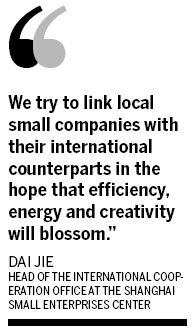

Family business
To endure, a family business must be willing to reinvent itself, Dong says. After introducing the first production line from Japan, Dong hired more than 30 researchers and a plant with 300 employees to focus on research and development.
Today, the company boasts more than 30 patents and holds half of the market share in the domestic commercial car sector.
While Dong's push to build a local brand drove the company to innovate, it also led to an unexpected problem - its own reluctance to compromise on foreign partnerships.
"When we were on track to form a partnership overseas, the president insisted that we be the controlling party of the joint venture, so negotiations reached an impasse," says board secretariat Dong Yaojun, who is Dong Rongyong's nephew.

It was then the company turned to the SSEC, which had just started organizing regular international fairs for specific industries to bring local and foreign SMEs together. The center awarded Guangyu 4 million yuan ($627,000) as an incentive to develop core technologies.
The younger Dong soon became an active member, joining a group trip to Japan and South Korea, where he made numerous valuable contacts.
"The SME center knows our needs, and they are good at matching us with good contacts without sacrificing our interests," Dong Yaojun says.
Similarly, it was thanks to SSEC that Shanghai SIIC Zhen-tai Chemical Co Ltd managed to anchor an overseas expansion in a turnaround battle for its domestic market.
With just 200 employees, Zhen-tai produces about half of China's magnesium oxide products for manufacturing companies, including special silicon steel grade magnesium oxide, widely used to isolate coating material.
Quality awareness
Although winning quality awards and owning a wide range of patents, its once-dominant market share fell in the 1990s after it lost expert personnel to rivals and suffered technological leaks.
"One effective action was to make a foray into foreign markets, and partner with recognized industrial heavyweights," says Zong Jun, Zhen-tai's general manager.
That proved difficult because Chinese brands, especially small and medium-sized enterprises, have yet to win trust among global customers.
But the SSEC put them in touch with Israel-based Dead Sea Works, the world's leading producer of magnesium oxide.
Zhen-tai's cutting-edge technologies and local research quickly impressed its partner, allowing it to take new orders and manufacture on behalf of Dead Sea Works.
The cooperation has since helped Zhen-tai accrue 80 percent of the overseas market share. Its global reputation led to it winning orders from domestic steel giants including the Shougang Group.
Orders from both domestic and overseas clients have picked up since mid-2013, and Zhen-tai is planning to take on more employees, says Zong.
The recent opening of China (Shanghai) Pilot Free Trade Zone has set Wang Zhendong thinking about ways to go international. Wang, head of the Shanghai Coffee Association, which oversees about 100 small coffee dealers in the city, would like to set up an international coffee trading center in the zone.
"China has no influence internationally over the pricing of coffee, which puts it at a disadvantage," says Wang, referring to recent concern over Starbucks' price differentiation strategy for China.

